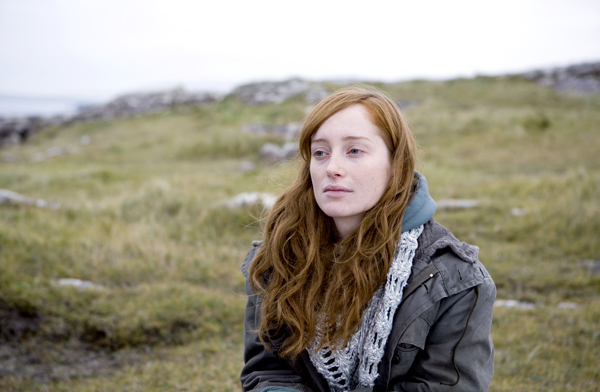|
Reviews of Recent Independent, Foreign, & Documentary Films in Theaters and DVD/Home Video

NOTHING PERSONAL Director Urszula Antoniak’s revelations on friendship, love, and the art of filmmaking may shock the faint of heart, but no one can question the power and beauty of her debut film. With the stealth craftsmanship and sensibility of the late novelist and filmmaker Marguerite Duras (The Malady of Death and Hiroshima, Mon Amour), Antoniak explores the interplay and necessities of secrecy, non-communication, avoidance, and minimalism in the burgeoning relationship between a young woman and an older man. The plot couldn’t be simpler. A woman (Lotte Verbeek) of ambiguous identity removes her wedding ring, sells her belongings, leaves her small apartment in Holland—and with only the barest essentials on her back—sets off for Ireland and a new life. Aside from what we fleetingly observe, we know nothing about this woman, including her name. What we can surmise is that she’s been hurt and that she no longer trusts men. We know this because she hitches a ride with a man and the moment he reaches into his pocket, she imagines the worst and jumps from his moving vehicle. Flabbergasted, he attempts to follow her on foot, but she lunges toward him, shrieking as if insane, and he promptly drives away. Walking through the lush greenery of Ireland, the woman comes upon the modest farm house of a sickly hermit, superbly enacted by Stephen Rea (The Crying Game). Finding his door unlocked, she goes inside and audaciously listens to his music, sits on his comfortable chair, prowls through his pantry, and even tries out his empty bed. Finding all this interesting, but at the same time disheartening, she settles on an outdoor settee, which is where he finds her. In many ways the growing friendship between this unnamed couple progresses with the often comic contempt and surrealism of a David Lynch movie that is somehow tempered by the magic of John Cromwell’s The Enchanted Cottage (1945). Whether or not a certain type of witchcraft encompasses this mysterious woman, who agrees only to respond to “you,” is questionable. But whatever her power, somehow he becomes younger and happier for a time, and she, less hardened and beautiful. Antoniak’s filmmaking is bold
and experimental. She is unafraid to use jump cuts when needed or to
edit
with the fluidity of poetry. More than that, she presents her film
primarily in silence so that her actors speak through the prowess of
their physicality and faces. Only the finest of actors can adapt to such
a task, and luckily Verbeek and Rea are masters of their craft. Even the
magnificent, rugged landscape plays a role in Antoniak’s film. It
creates a lovely yet disturbing moodiness that juxtaposes with the often
violent intensity of the actors—and in so doing, strengthens the
supernaturalism we feel. All in all,
Nothing Personal is one of those rare gems that provoke many
lasting questions. Urszula Antoniak is a filmmaker well worth all our
attention in the future.
Amy R. Handler
|

